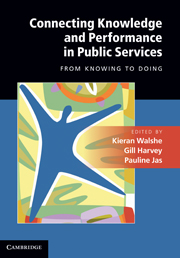Book contents
- Frontmatter
- Contents
- List of figures
- List of tables
- List of boxes
- Notes on contributors
- Foreword
- 1 Introduction: knowledge and performance – theory and practice
- 2 Knowledge from inspection: external oversight and information to improve performance
- 3 How is information used to improve performance in the public sector? Exploring the dynamics of performance information
- 4 Citizens, users or consumers: the voice of the public and its influence on improving performance
- 5 Competition and choice: the place of markets in connecting information and performance improvement
- 6 The role of corporate governance and boards in organisational performance
- 7 Change at the top: connecting political and managerial transitions with performance
- 8 The role of leadership in knowledge creation and transfer for organisational learning and improvement
- 9 Process Improvement and Lean Thinking: using knowledge and information to improve performance
- 10 Using evidence: how social research could be better used to improve public service performance
- 11 Absorptive capacity: how organisations assimilate and apply knowledge to improve performance
- 12 Knowing through doing: unleashing latent dynamic capabilities in the public sector
- 13 Conclusions: a puzzle, three pieces, many theories and a problem
- Index
- References
6 - The role of corporate governance and boards in organisational performance
Published online by Cambridge University Press: 05 July 2011
- Frontmatter
- Contents
- List of figures
- List of tables
- List of boxes
- Notes on contributors
- Foreword
- 1 Introduction: knowledge and performance – theory and practice
- 2 Knowledge from inspection: external oversight and information to improve performance
- 3 How is information used to improve performance in the public sector? Exploring the dynamics of performance information
- 4 Citizens, users or consumers: the voice of the public and its influence on improving performance
- 5 Competition and choice: the place of markets in connecting information and performance improvement
- 6 The role of corporate governance and boards in organisational performance
- 7 Change at the top: connecting political and managerial transitions with performance
- 8 The role of leadership in knowledge creation and transfer for organisational learning and improvement
- 9 Process Improvement and Lean Thinking: using knowledge and information to improve performance
- 10 Using evidence: how social research could be better used to improve public service performance
- 11 Absorptive capacity: how organisations assimilate and apply knowledge to improve performance
- 12 Knowing through doing: unleashing latent dynamic capabilities in the public sector
- 13 Conclusions: a puzzle, three pieces, many theories and a problem
- Index
- References
Summary
Introduction
For more than two decades, successive UK governments have been concerned with modernising the delivery of public services and seeking performance improvements. As part of this drive, corporate governance arrangements across the sector have been reformed and much greater attention has been paid to the training, development and support of those serving on governing bodies and boards. An underlying assumption of these shifts in policy is that improvements in corporate governance arrangements, and in particular the working of boards, will lead to improvements in effectiveness. This chapter examines what evidence there is to support that assumption.
Before proceeding it is important to be clear about what we mean by corporate governance. The term governance has become an important concept in a variety of different disciplinary and practice arenas including management, public administration, public policy and politics. It has its roots in a Latin word meaning to steer or give direction. As Kooiman (1999) notes in a useful review article, the term is used in a number of different ways which can lead to confusion. He suggests one useful way of distinguishing between different usages is in terms of levels of analysis. The focus here is on the organisational level, and the term corporate governance will be used to refer to the structures, systems and processes concerned with ensuring the overall direction, control and accountability of an organisation.
Information
- Type
- Chapter
- Information
- Connecting Knowledge and Performance in Public ServicesFrom Knowing to Doing, pp. 99 - 127Publisher: Cambridge University PressPrint publication year: 2010
References
Accessibility standard: Unknown
Why this information is here
This section outlines the accessibility features of this content - including support for screen readers, full keyboard navigation and high-contrast display options. This may not be relevant for you.Accessibility Information
- 17
- Cited by
